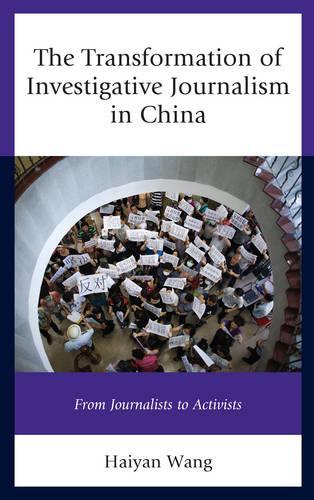
The Transformation of Investigative Journalism in China: From Journalists to Activists
(Hardback)
Available Formats
Publishing Details
The Transformation of Investigative Journalism in China: From Journalists to Activists
By (Author) Haiyan Wang
Bloomsbury Publishing PLC
Lexington Books
29th April 2016
United States
Classifications
Professional and Scholarly
Non Fiction
Politics and government
070.430951
Physical Properties
Hardback
188
Width 162mm, Height 235mm, Spine 20mm
435g
Description
Investigative journalism emerged in China in the 1980s following Deng Xiaopings media reforms. Over the past few decades, Chinese investigative journalists have produced an increasing number of reports in print or on air and covered a surprisingly wide range of topics which had been thought impossible by the standards of the Communist era. In the 2010s, however, investigative journalism has been replaced by activist journalism. This book examines how, with the aid of new media technologies and in response to new calls for social responsibility, these new-era journalists vigorously seek to expand the scope of their journalism and their capacity as journalists. They tend to perceive themselves as more than professional journalists, and their activities are not limited to the physical boundaries of newsrooms. They are not only detached observers of society but also engaged organizers of social movementsthey are social activists as well as responsible journalists who challenge state power and the party line and point to the limitations of the more traditional conceptions of journalism in China. This book analyzes how journalism in China has been gradually transformed from a tool of the state to a means of broadening calls for democratic reform.
Reviews
Wang (Shenzhen Univ.) describes how elite Chinese journalists recently created a professional paradigm that blends social activism with investigative reporting. Wang suggests the formation of an investigative and advocacy journalistic model is a unique adaptation to contemporary governmental controls, social norms, and journalistic practices in China. Wang explains that leading Chinese journalists are increasingly focused on fostering democratic reforms in China and sometimes help organize social reform movements.... [T]he text is well researched with helpful chapter footnotes, a bibliography, and an index. The books thesis contrasts with the portrayal of Chinese journalism in some recent books, such as Doug Young'sThe Party Line: How the Media Dictates Public Opinion in Modern China (Wiley, 2013). Recommended for collections in international journalism as well as contemporary Chinese culture. Summing Up: Recommended. Upper-division undergraduates through professionals. * CHOICE *
Well-researched and documented, Haiyan Wangs book successfully maps out the process by which investigative journalism in China has taken an advocacy turn to become an activist form of journalism during the reform era. It shows how the journalistic professionalism of the West is appropriated for the articulation of an emergent journalistic paradigm that is rooted in Chinese intellectual traditions and contextual dynamics. The book will become a key text for anyone interested in the mutual constitution between journalism and social change in contemporary China. -- Joseph M. Chan, The Chinese University of Hong Kong
Haiyan Wang has written a smart, eye-opening book about investigative journalism and activism. Wang deftly shows how and why investigative reporting often blends into activist reporting in contemporary China, given persistent limitations grounded in the countrys media politics and economics. The analysis is grounded in impeccable research and offers novel insights into how journalists negotiate personal and institutional commitments amid challenging conditions. This book is a must-read for understanding why investigation and activism are not divergent journalistic traditions. -- Silvio Waisbord, George Washington University
Lucidly written and richly contextualized, Dr. Wang's compelling analysis of investigative journalism and activism clarifies the ambiguities and contradictions of media reform in China. It also holds considerable implication for comparative communication. -- Chin-Chuan Lee, City University of Hong Kong
Author Bio
Haiyan Wang is associate professor in the School of Media and Communication at Shenzhen University.
